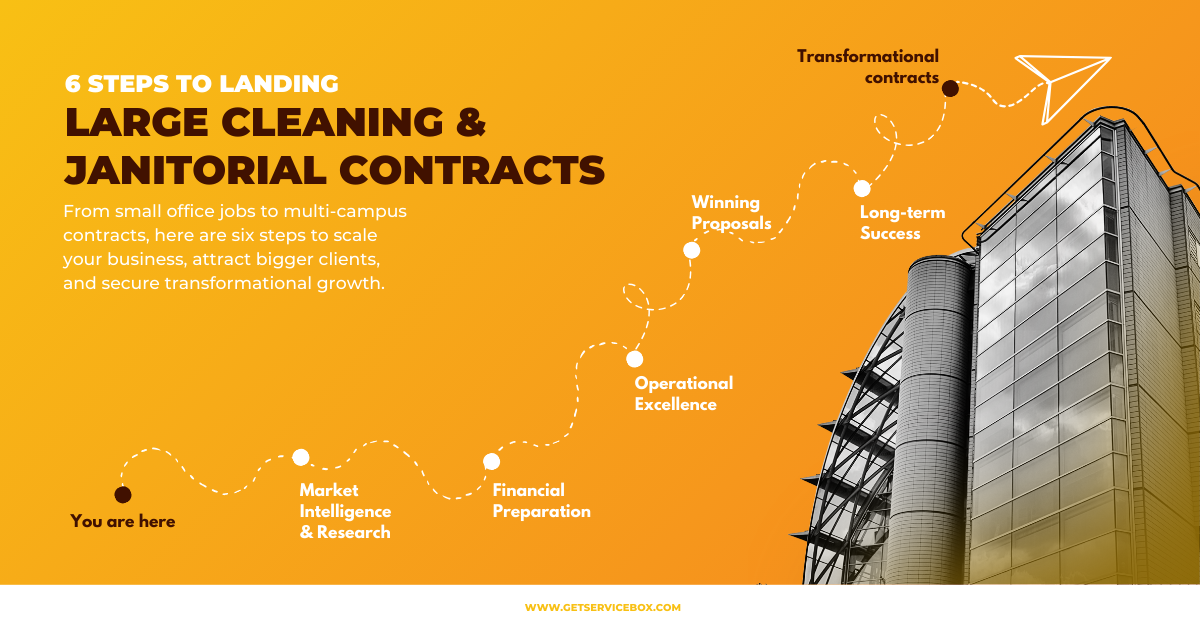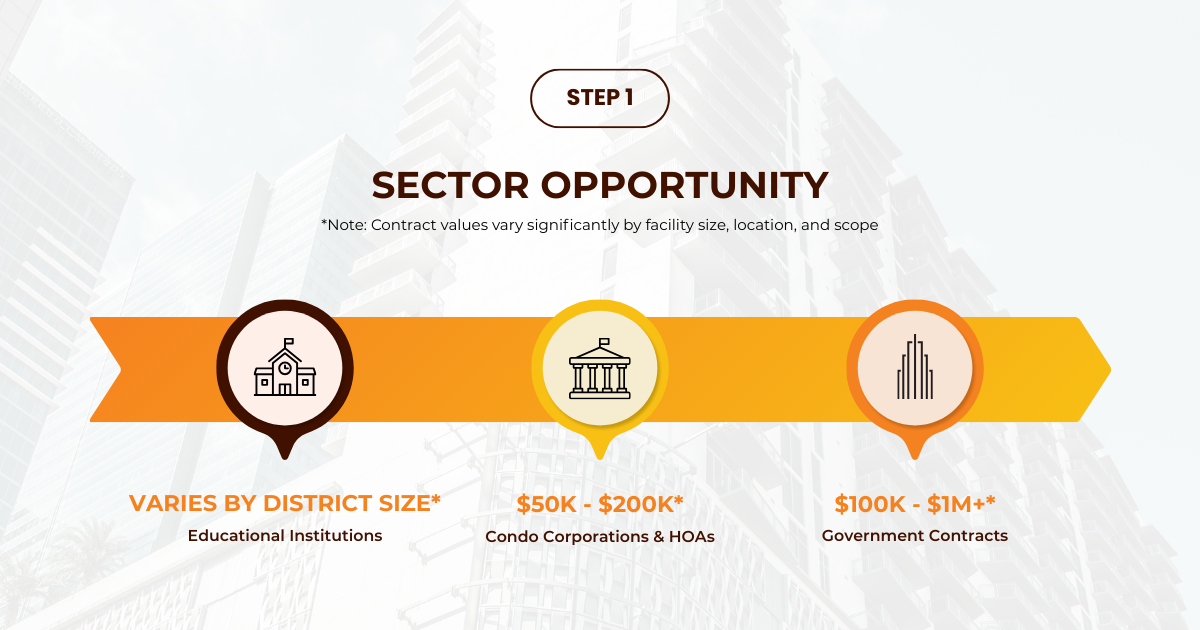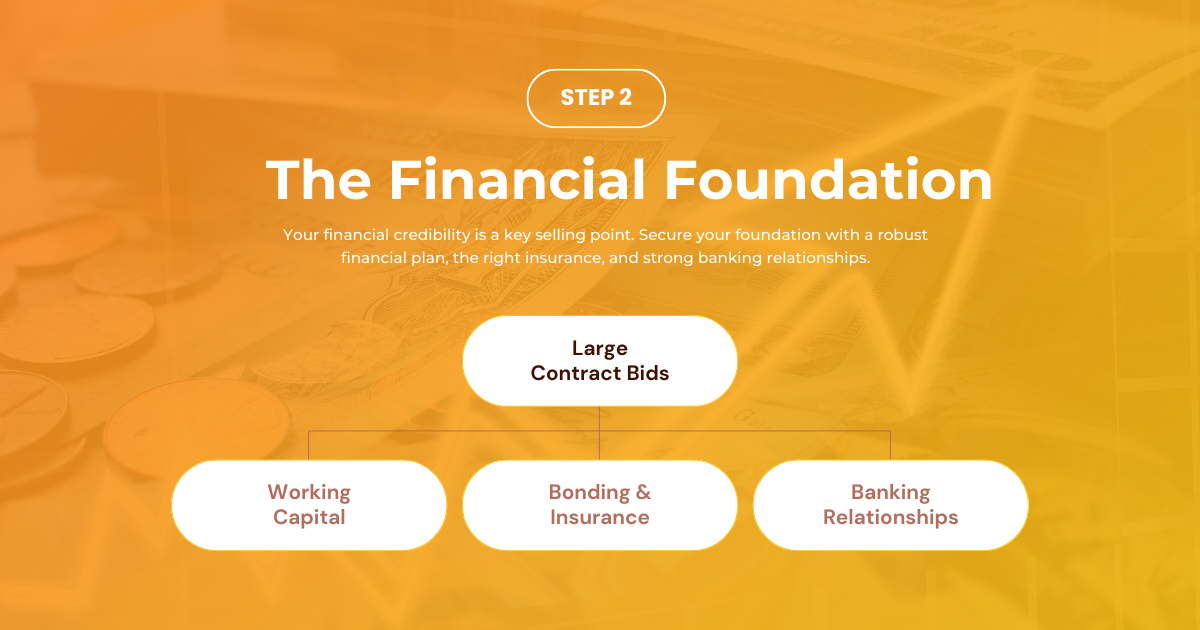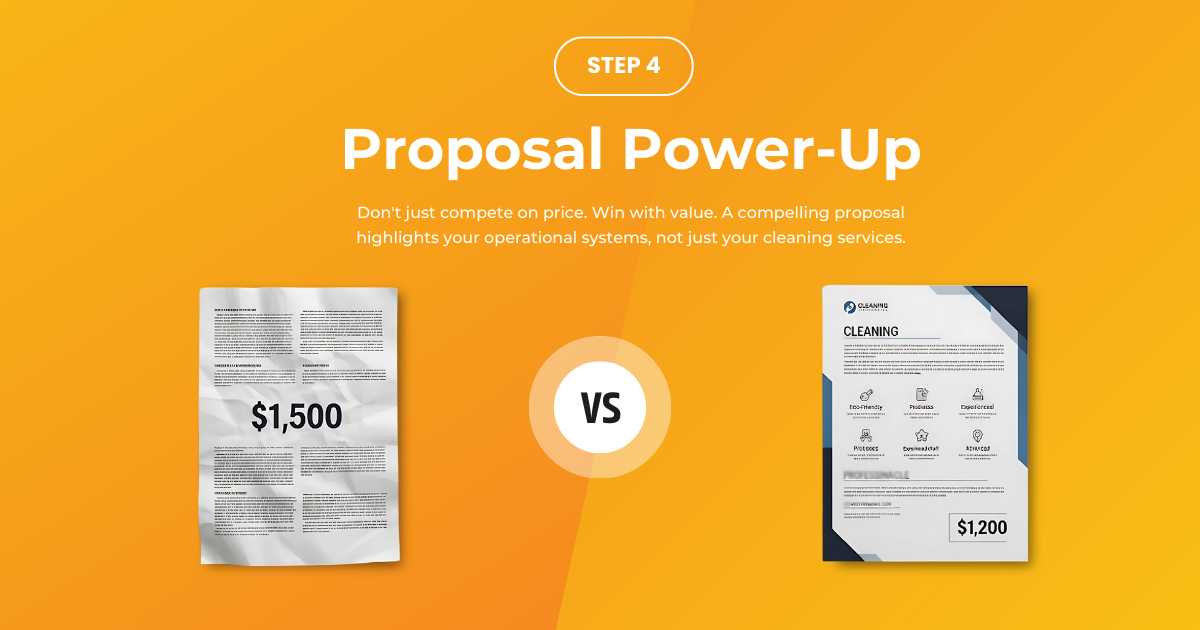
How can I get large cleaning contracts? This is the question we hear most often from mid-sized commercial cleaning companies ready to grow beyond small office accounts.
The answer isn't just about bidding lower or working harder. It's about targeting contracts that will truly transform your business, not just keep it afloat.
For most cleaning businesses, growth follows a predictable path: a few office accounts this quarter, a mid-sized building contract next year.
But every so often, an RFP lands on your desk that could transform your entire business: a five‑year janitorial contract across multiple corporate campuses. Hospitals. Universities. Airports.
These contracts mean more than just bigger checks. They're more complex, higher risk, and come with clients who expect perfect service at every location. This is where most cleaning companies either prove they're ready for the big leagues or discover they're not.
This guide breaks down six practical steps to help mid-sized commercial janitorial companies move beyond smaller jobs and confidently pursue major contracts. Along the way, we’ll show how the right tools can streamline quoting, scheduling, and day-to-day operations. It can make your business stand out and show you why ServiceBox has become the choice for companies making this leap.
Finding large contracts starts with systematic market intelligence. Large contracts don't just appear. You need a clear strategy to identify and secure them

Condo Corporations and HOAs: These contracts typically range from $50K-$200K annually and offer excellent entry points into larger commercial work. Condo boards meet quarterly and often issue RFPs during budget planning seasons (October-December). Focus on newer developments with 200+ units where professional management companies handle procurement.
Educational Institutions: Schools and universities represent some of the most stable commercial cleaning contracts available. K-12 districts often have summer RFP cycles (May-July) with contracts starting in August. Universities typically issue facilities management RFPs on 3-5 year cycles. Summer break periods offer the best opportunities for deep cleaning and facility upgrades.
Government Contracts: Federal, state, and local government agencies provide the most lucrative opportunities but require specific preparation. In the United States, register with SAM.gov for federal opportunities and check state procurement websites monthly. In Canada, use CanadaBuys.canada.ca (which replaced the older buyandsell.gc.ca system) and MERX.com for comprehensive government contract opportunities. Government contracts often have strict bonding requirements and detailed compliance specifications.
Understanding Your Competition: Research who currently holds major contracts in your target sectors. Study their service offerings, pricing models, and proposal approaches. Most procurement processes are public record; you can access this information via government procurement portals (such as SAM.gov in the U.S. or CanadaBuys in Canada), Freedom of Information (FOI) requests, or by reviewing contract award announcements and tender databases. Use this intelligence to understand winning strategies and benchmark your own proposals.
Differentiating Your RFP Process. Large clients evaluate contractors on operational capability, not just price. While competitors focus on basic cleaning services, position your business around systematic operations, technology integration, and measurable performance standards.
Writing estimates for large cleaning contracts requires more than calculating labor and materials. Financial credibility must be established before you even see the RFP, as enterprise clients evaluate contractors' ability to deliver consistent service over multi-year agreements.

Government Job Requirements: Federal contracts often require 60-120 day payment terms with performance bonds up to 100% of contract value. State and local contracts typically have 30-60 day terms but may require prevailing wage compliance, increasing labor costs by 20-40%.
Working Capital Planning: Large contracts require substantial upfront investment. Calculate equipment costs, initial supply purchases, staff recruitment, and training expenses. Plan for 90-120 days of operational expenses before receiving first payment.
Higher Requirements for Bigger Contracts: Contracts over $100K typically require performance bonds, payment bonds, and increased insurance coverage. General liability should be a minimum $2M per occurrence, with workers' compensation and bonding capacity matching contract value.
Banking Relationships: Establish relationships with commercial lenders experienced in service industry financing. Large contracts may require equipment financing, working capital lines, and bonding capacity that exceeds typical small business banking services.
Enterprise procurement teams assess contractor financial stability through audited statements, bonding capacity, and operational track records. They want documented proof that you can maintain service levels throughout multi-year agreements without financial disruption.
Prepare comprehensive financial documentation including:
Enterprise clients aren't buying cleaning services. They're buying operational predictability across multiple locations with consistent quality standards.
Scaling Preparation: Large contracts require significant workforce expansion with tight implementation deadlines. Build recruitment pipelines and staffing partnerships before you need them to ensure rapid deployment when contracts are awarded.
Staff Retention: A stable workforce maintains service consistency that large clients demand. Competitive compensation and clear advancement opportunities reduce turnover costs and protect client relationships.
Standardized Training Systems: Develop documented training programs specific to each contract type. Healthcare facilities require specialized infection control training. Educational institutions need background check protocols and child protection awareness. Government facilities often require security clearances and compliance training.
Quality Control Measures: Implement systematic inspection processes, client feedback systems, and performance metrics tracking. Large clients expect measurable service delivery standards with documented compliance records.

Leveraging the right technology is essential for large-scale operations. Platforms like ServiceBox help you demonstrate operational sophistication.
ServiceBox Job Management Platform: Landing a major new contract means your operational systems will be put to the test. When a client needs a detailed service report, a disorganized approach will put you at a disadvantage. With ServiceBox, your work orders, timesheets, and detailed service reports are all managed in one place, complete with GPS-verified timesheets and photo evidence. This level of professionalism builds client trust and sets you apart from the competition.
ServiceBox Quoting & Estimation Software: Bidding on a multi-site contract requires you to quote multiple buildings with unique specifications. Instead of building each quote from scratch, ServiceBox helps you to create professional, branded proposals quickly. You can easily duplicate, adjust and track quotes for similar facilities, giving you the upper hand when pursuing large contracts.
ServiceBox Scheduling & Dispatching Software: Clients love quick responses, especially to emergencies. ServiceBox's scheduling dashboard provides real-time updates to mobile devices. You can instantly see the nearest team member via GPS tracking and dispatch them in seconds. This not only optimizes routing and verifies location but also proves your operational reliability.
Integrated Workflow Management: With ServiceBox, a successful proposal becomes a flawless reality. It instantly converts an approved quote into active work orders, saving you hours of manual data entry. You can then generate an invoice with a single click, complete with all documentation, proving your operational sophistication to any procurement team.

RFP vs. Private Proposals: RFP responses must follow exact specifications and submission requirements. Any deviation can disqualify your bid regardless of price competitiveness. Private proposals allow more flexibility to demonstrate value-added services and unique capabilities.
Technical Specifications and Compliance: Large contracts include detailed technical requirements for equipment, chemicals, and procedures. Address every specification explicitly with supporting documentation. Include equipment lists, chemical safety data sheets, and staff certification records.
Differentiation Through Systems: While competitors submit basic service descriptions, demonstrate operational sophistication through technology integration, real-time reporting capabilities, and documented quality control procedures.
Beyond Lowest Price: Large clients prioritize service reliability over marginal cost savings. Price competitively but emphasize total value delivery, including reduced management overhead, consistent performance, and measurable results.
Government and institutional clients often require specific certifications, equipment standards, and procedural compliance. Address these requirements explicitly with supporting documentation rather than general capability statements.
Environmental compliance, safety protocols, and staff background check procedures should be detailed with specific implementation timelines and responsible personnel identified.
Winning the initial contract is just the beginning. Contract renewals and expansions represent where the real profitability lives.

Account Management: Assign dedicated managers to large contracts with regular check-ins and performance reviews. Proactive communication prevents small problems from becoming contract-ending disasters.
Value-Added Services: Offer complementary services like window cleaning, carpet care, or minor maintenance to increase contract value and create additional revenue streams.
Track Everything: Document service delivery, client satisfaction, and performance improvements. This data becomes critical for renewal negotiations and winning new contracts.
Plan Renewals Early: Start renewal discussions 6-12 months before expiration. Present performance data and service enhancements that demonstrate continued value.
Undercapitalization: The most common failure point for contractors pursuing large contracts is insufficient working capital. Plan for 90-120 day payment cycles and higher operational expenses before first payment.
Inadequate Insurance Coverage: Skimping on insurance coverage to reduce costs can disqualify you from contract consideration. Enterprise clients require comprehensive coverage that protects both parties from operational risks.
Poor Communication Systems: Large contracts require systematic communication protocols with multiple stakeholders. Informal communication approaches that work for small accounts create problems with enterprise clients who expect professional reporting and response procedures.
Start Smaller to Build Capabilities: Most successful large contract winners begin with mid-sized opportunities ($50K-$100K) to develop systems and references before pursuing million-dollar contracts.
Invest in Technology Early: Contractors using integrated management systems like ServiceBox consistently outperform competitors using manual processes or basic software tools. Technology investment pays dividends through operational efficiency and client confidence.
Develop Niche Expertise: Specializing in specific facility types (healthcare, education, government) allows you to command premium pricing and reduces direct competition from generalist cleaning companies.
Contract Transfer Planning: Large contracts may need to be transferred or terminated due to business changes. Develop transition procedures that protect client relationships and maintain professional reputation even when contracts end.
Succession Planning: Building systematic operations around documented procedures rather than individual relationships enables business transitions and reduces key person risk that concerns enterprise clients.
Large janitorial contracts can open the door for mid-sized cleaning companies to grow beyond their local markets. But winning these contracts takes more than just offering a low price. It calls for careful preparation, solid operations, and the kind of systems that enterprise clients rely on.
The six steps in this guide help you get there: finding the right opportunities through market research, making sure your finances can support bigger contracts, building strong teams and processes, and presenting proposals that clearly show what you can deliver. Just as important, thinking beyond the first contract helps turn early success into steady, long-term growth.
ServiceBox helps mid-sized contractors run their businesses at a larger scale. From quoting jobs to invoicing and reporting, it keeps everything organized and ready for the demands of bigger clients. When large companies choose a cleaning partner, they’re not just buying a service—they’re looking for a contractor who can handle the details reliably and professionally.
Ready to compete for transformational contracts?
Explore our solutions:
Our customers love the affordability and flexibility of our software. ServiceBox is priced to ensure you see a return on your investment. We have pricing options that align with your needs; whether you’re a one-person service business or manage a large team in the field.
